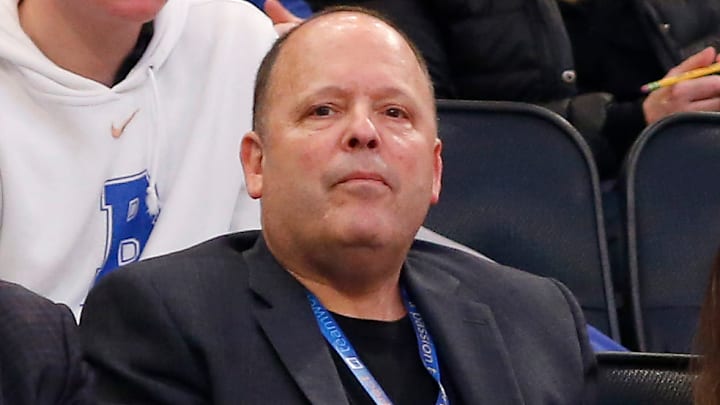Although the New York Knicks do not own a first-round pick in the upcoming 2025 NBA draft, they suddenly have a painfully obvious way of trading for one: by calling the Brooklyn Nets.
The Orange and Blue’s crosstown rival just facilitated a three-team deal with the Atlanta Hawks and Boston Celtics that sees Kristaps Porzingis landing in A-Town, Georges Niang headed to Beantown, and Terance Mann winding up in the good ol’ BK. The Nets also bagged the No. 22 pick in Wednesday’s draft, giving them a total of five first-rounders—an embarrassment of riches that also includes Nos. 8, 19, 26, and 27.
Brooklyn is not going to keep all those picks. It has the roster space, but integrating five prospects, all on the same contractual timelines, would be absolute insanity. General manager Sean Marks is going to package some combination of them into something else.
This “something else” could be another lottery selection, future draft picks, or actual players from other rosters. On the surface, the Knicks don't have assets that check any of those boxes. And yet, because the Nets already control so much of New York’s future, that’s actually not true.
The Knicks can turn swaps into genuine first-round picks
After last summer’s avalanche of wheeling and dealing, the Knicks don’t have any outright first-round picks to trade. Brooklyn controls their selections in 2025, 2027, 2028 (swap rights), 2029 and 2031. New York has the Washington Wizards’ 2026 first-rounder, but it turns into 2026 and 2027 seconds if it falls inside the top eight (which it totally will).
Still, the Knicks have first-round swaps to trade in 2026, 2030, and 2032. And while swaps have finite value, since they are not guaranteed to be exercised, New York’s timeline makes those latter two years (2030 and 2032) particularly intriguing.
Those drafts post-date every single contract currently on the teams. Other squads can talk themselves into believing that this core will age out, that the Knicks will be bad, and that they’ll end up with a top draft selection as a result.
This is an especially compelling sales pitch for the Nets. They already control so much of New York’s future that it almost behooves them to keep doubling down. And it’s not just about banking on the Knicks to be bad. Gaining control over more picks increases the chances that New York eventually seeks to compensate the Nets for getting those rights back. Brooklyn itself has plenty of experience in this arena. It just (over)paid to regain control over its own 2025 and 2026 first-rounders from the Houston Rockets.
New York must decide if the cost is worth it
Granted, this is all predicated on the Knicks actually wanting a first-round pick. That’s not a guarantee. Their arduous coaching search suggests they won’t make any changes on Wednesday or Thursday night.
New York will also only have interest in landing first-rounders if it intends to develop them while attempting to contend. That’s not an easy task, and it’s another wrinkle inextricably tied to who it hires as the next head coach.
The mere concept is nevertheless tantalizing. The Knicks will get prohibitively expensive in the years to come. Having cost-controlled players on rookie-scale deals can go a long way towards deepening the rotation—and extending the team’s contention window.
Is giving up control of, say, that 2030 swap worth getting the No. 19 pick? Or how about Nos. 22 and 26? That’s debatable. But with the Nets hoarding so much first-round capital, it’s at least an option the Knicks can explore.
